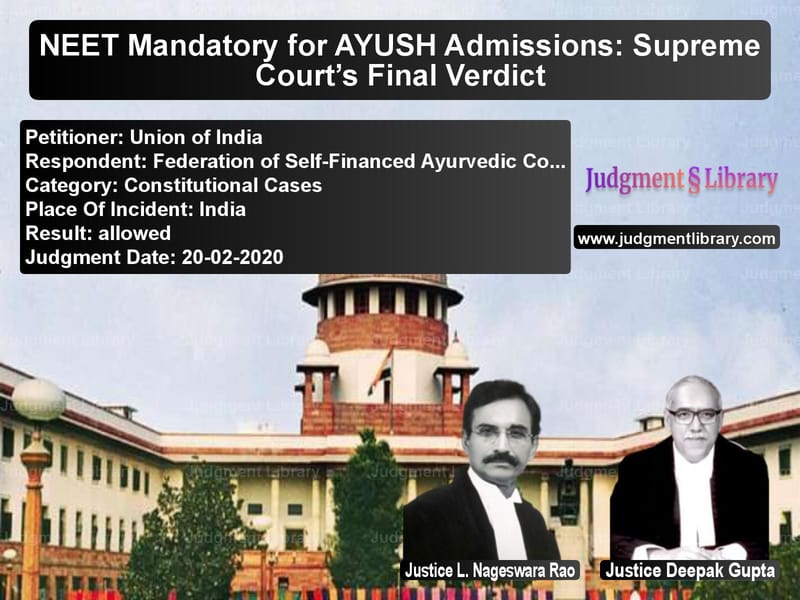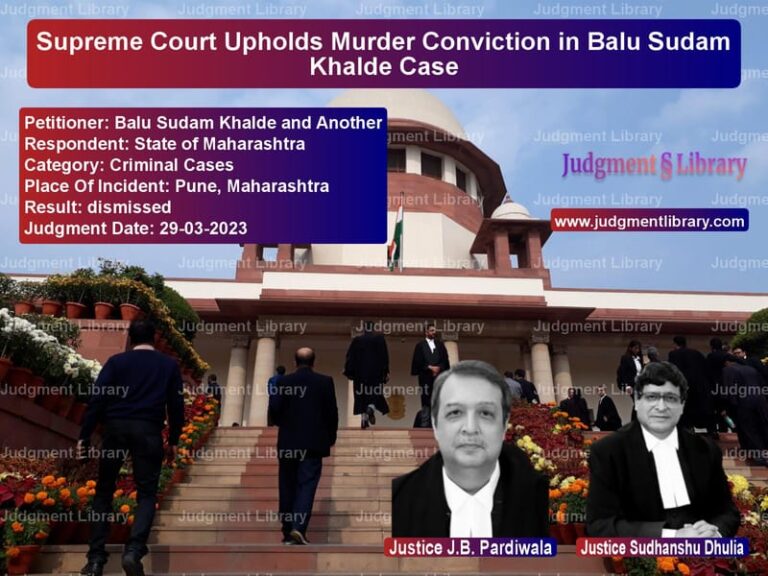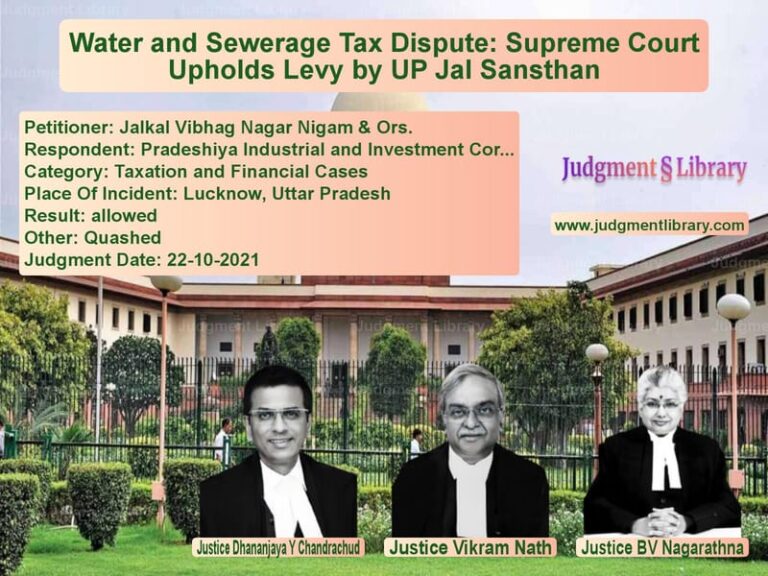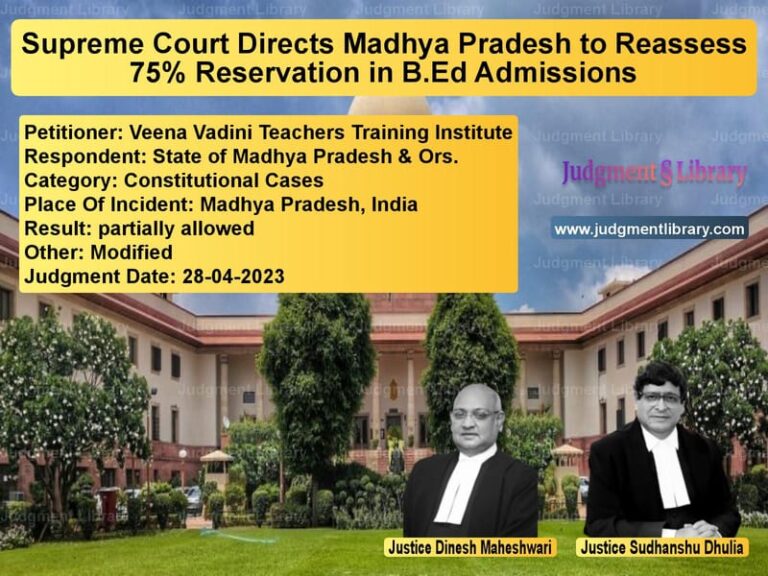NEET Mandatory for AYUSH Admissions: Supreme Court’s Final Verdict
The case of Union of India v. Federation of Self-Financed Ayurvedic Colleges, Punjab & Ors. revolves around the mandatory requirement of the National Eligibility cum Entrance Test (NEET) for admissions to undergraduate (BAMS, BUMS, BSMS, and BHMS) and postgraduate (MD-Ayurveda) AYUSH courses. The Supreme Court’s verdict clarifies whether the Central Council of Indian Medicine and the Central Council of Homeopathy have the legal authority to enforce this requirement through their notifications.
Background of the Case
The Central Government, through the Ministry of Ayurveda, Yoga & Naturopathy, Unani, Siddha, and Homeopathy (AYUSH), had issued guidelines requiring students seeking admission to AYUSH undergraduate courses to qualify NEET from the academic year 2018-19 onward. The minimum eligibility marks were set at the 50th percentile for general candidates and the 40th percentile for Scheduled Castes (SC), Scheduled Tribes (ST), and Other Backward Classes (OBC).
By a notification dated 7th December 2018, the Central Council introduced amendments to the Indian Medicine Central Council (Minimum Standards of Education in Indian Medicine) Regulations, 1986, making NEET a mandatory entrance examination for AYUSH courses. The same requirement was introduced for homeopathy courses under a separate notification.
Various AYUSH colleges challenged these notifications in different High Courts, particularly the Punjab and Haryana High Court, arguing that NEET was not designed for AYUSH courses and that its syllabus was based on modern medicine (MBBS/BDS), making it unfair for AYUSH aspirants.
Legal Issues Involved
- Whether the Central Council of Indian Medicine and the Central Council of Homeopathy had the authority to introduce NEET as a mandatory criterion for AYUSH admissions.
- Whether the 2018 regulations were ultra vires the Indian Medicine Central Council Act, 1970.
- Whether prescribing a minimum qualifying percentile in NEET for AYUSH courses was justified.
- Whether the Supreme Court should uphold the Punjab and Haryana High Court’s ruling that supported the regulations.
Petitioner’s Arguments
The petitioners, which included AYUSH colleges and students, contended:
- The 2018 regulations were beyond the rule-making authority of the Central Council under Section 36 of the Indian Medicine Central Council Act, 1970.
- NEET was structured for MBBS/BDS admissions and did not align with the syllabus of AYUSH courses.
- Without a specific legislative amendment similar to the Indian Medical Council Act, 1956, and the Dentists Act, 1948, the introduction of NEET for AYUSH courses was illegal.
- Requiring NEET for AYUSH admissions had led to large-scale vacancies in AYUSH colleges, depriving students of education opportunities.
Respondent’s Arguments
The Union of India and the Central Council defended the regulations, stating:
- Under Section 22 of the Indian Medicine Central Council Act, the Central Council had the power to prescribe minimum standards for education, including entrance examinations.
- NEET ensured that only competent students entered the AYUSH field, maintaining the quality of education and preventing unqualified doctors from practicing.
- NEET was a uniform system applicable across different medical streams, ensuring a standard benchmark for admission.
- The regulation-making power under Section 36 included authority to set admission standards.
Supreme Court’s Analysis
The Supreme Court examined the powers of the Central Council under the Indian Medicine Central Council Act, 1970. The Court held:
- Section 22, which empowers the Council to set educational standards, includes the power to prescribe an entrance examination.
- The precedent set by the Veterinary Council of India v. Indian Council of Agricultural Research case confirmed that regulatory bodies can set entrance standards.
- The lack of eligible students was not a justification to lower academic standards.
- The AYUSH admission process must be uniform, and NEET ensured merit-based selection.
Final Judgment
The Supreme Court upheld the validity of the 2018 regulations, affirming that:
- NEET is a mandatory requirement for admission to AYUSH undergraduate and postgraduate courses.
- The 2018 regulations are legally valid and within the authority of the Central Council.
- AYUSH colleges cannot admit students without NEET qualification.
- The students who were admitted through High Court interim orders before the final judgment may continue their studies as a one-time exception.
Impact of the Judgment
The ruling has significant implications for AYUSH education in India:
- It establishes NEET as the standard entrance test for all medical streams, including AYUSH.
- It prevents substandard admissions and ensures a minimum educational benchmark.
- It reinforces the authority of regulatory councils in maintaining educational standards.
Overall, this landmark judgment ensures quality in AYUSH education while aligning its admission process with modern medical courses.
Petitioner Name: Union of India.Respondent Name: Federation of Self-Financed Ayurvedic Colleges, Punjab & Ors..Judgment By: Justice L. Nageswara Rao, Justice Deepak Gupta.Place Of Incident: India.Judgment Date: 20-02-2020.
Don’t miss out on the full details! Download the complete judgment in PDF format below and gain valuable insights instantly!
Download Judgment: Union of India vs Federation of Self-F Supreme Court of India Judgment Dated 20-02-2020.pdf
Direct Downlaod Judgment: Direct downlaod this Judgment
See all petitions in Fundamental Rights
See all petitions in Constitution Interpretation
See all petitions in Judgment by L. Nageswara Rao
See all petitions in Judgment by Deepak Gupta
See all petitions in allowed
See all petitions in supreme court of India judgments February 2020
See all petitions in 2020 judgments
See all posts in Constitutional Cases Category
See all allowed petitions in Constitutional Cases Category
See all Dismissed petitions in Constitutional Cases Category
See all partially allowed petitions in Constitutional Cases Category







